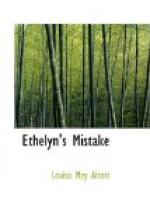How merrily they all laughed and chatted together! and how handsome James’ eyes grew as they rested admiringly upon the sprightly girl, who perfectly conscious of his gaze, never looked at him, but confined her attention wholly to Richard, until Andy asked “if they could not have a bit of a tune.”
Then, for the first time, Richard discovered that Ethelyn’s piano had been unpacked, and was now standing between the south windows, directly under Daisy’s picture. It was open, too, and the sheet of music upon the rack told that it had been used. Richard did not care for himself, but he was afraid of what Ethelyn might say, and wondered greatly why she had not spoken of the liberty they had taken.
Ethelyn had not observed the piano; or if she did she had paid no attention to it. Accustomed as she had always been to seeing one in the room, she would have missed its absence more than she noticed its presence. But when, as she lay half dozing and thinking of Aunt Barbara, the old familiar air of “Money-musk,” played with a most energetic hand, came to her ear, she started, for she knew the tone of her own instrument—knew, too, that Melinda Jones’ hands were sweeping the keys—and all that Melinda Jones had done for her comfort was forgotten in the deep resentment which heated her blood and flushed her cheek as she listened to “Old Zip Coon,” which followed “Money-musk,” a shuffling sound of feet telling that somebody’s boots were keeping time after a very unorthodox fashion. Next came a song—“Old Folks at Home”—and in spite of her resentment Ethelyn found herself listening intently as James’ rich, deep bass, and John’s clear tenor, and Andy’s alto joined in the chorus with Melinda’s full soprano. The Markham boys were noted for their fine voices; and even Richard had once assisted at a public concert; but to-night he did not sing—his thoughts were too intent upon the wife upstairs and what she might be thinking of the performance, and he was glad when the piano was closed and Melinda Jones had gone.




